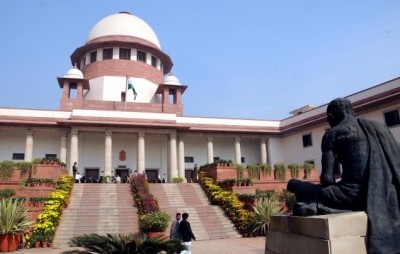
New Delhi, The Supreme Court has issued a contempt notice to the Securities and Exchange Board of India (SEBI) on Reliance Industries (RIL) plea alleging non-compliance of the court's August 5 order, which directed the market regulator to provide access to certain documents to the company.
A bench comprising Justices M.R. Shah and M.M. Sundresh said: "Issue notice to the respondent, making it returnable on December 2, 2022. Abhishek Singh, counsel accepts service of notice on behalf of the respondent."
Senior advocate Harish N. Salve, appearing on behalf of RIL, vehemently submitted that despite the August 5 order passed by the apex court by which the respondent (SEBI) was directed to furnish a copy of the documents, the same has not been furnished till date.
Senior advocate and former Attorney General of India K.K. Venugopal, representing SEBI, submitted that the review petition preferred by the respondent is pending before this court and, therefore, no further order be passed in the present proceedings.
The bench, in its order, noted: "We have gone through the subsequent order passed by this court dated October 12, 2022 in review petition. The pendency of an appeal and/or writ petition along with stay cannot be equated with pendency of the review petition.
I"There is a final decision by this court in an appeal. Merely because the stay application is pending in review petition cannot be a ground to grant stay by the respondent on its own and not to comply with the directions issued by this court."
The bench said it is required to be noted that the State of J&K Vs. Mohd. Yaqoob Khan and others was a case where against the ex-parte order passed by the single judge, pending writ petition, the contempt proceedings were initiated.
"Therefore, this court observed that when the stay application is yet to be heard and decided and disposed of, the contempt proceedings cannot be initiated. Under the circumstances, the said decision(s) cannot be of any assistance to the respondent," said the apex court.
The bench has scheduled the matter for further hearing on December 2.
The company had sought three documents from SEBI that it had claimed would exonerate it and its promoters from criminal prosecution initiated in a case related to the alleged irregularities in acquisition of its own shares between 1994 and 2000.
On August 5, a bench led by then Chief Justice N.V. Ramana, had said: "The approach of SEBI, in failing to disclose the documents, also raises concerns of transparency and fair trial. Opaqueness only propagates prejudice and partiality. Opaqueness is antithetical to transparency."
The top court had said the market regulator should show fairness and furnish documents sought by RIL, and SEBI has a duty to act fairly, while conducting proceedings or initiating any action against the parties.
RIL filed a contempt petition as SEBI has not shared three documents -- the two legal opinions by former Supreme Court judge B.N. Srikrishna and former ICAI President Y.H. Malegam's report which examined the irregularities.
The company claimed that SEBI cannot continue to resist the production of these documents and it had also sent a notice to the market regulator saying if documents were not received by August 18, then it will establish that SEBI does not want to comply with the apex court's judgment.
In 2002, Chartered Accountant S. Gurumurthy filed a complaint with SEBI alleging irregularities by RIL, its associate companies and their directors/promoters, including Mukesh Ambani and his wife, Nita; Anil Ambani and his wife, Tina; and 98 others.
The complaint cited the issue of two preferential placement of non-convertible debentures in 1994.
SEBI had alleged that RIL along with Reliance Petroleum had circuitously funded the acquisition of its own shares in violation of the Sections 77 and 77A of the Companies Act, 1956.


.jpeg)

